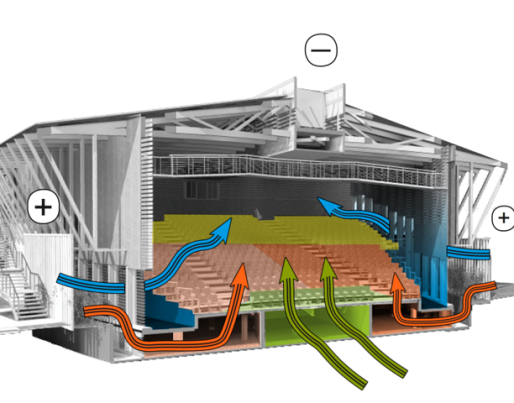ABC 21 Project: Africa-Europe Bioclimatic Buildings for XXI Century

ABC 21 Project: Africa-Europe Bioclimatic Buildings for XXI Century
It is urgent to study the best sustainable designs for warm climate zones to unleash their market and research potential, thus popularising these concepts to a broader audience. These designs involve bioclimatic approach, low-energy cooling techniques and the use of local construction materials, some of which already exist in Africa and only need to be identified and adapted. Combining these next-generation approaches with the best bioclimatic solutions will be the hallmark of the ABC 21 project.
The globalisation trends in the building sector resulted in the adoption of inadequate design solutions, especially for warm weather regions, which replicated designs that are far from sustainable or energy-efficient. The obsession with glazed-unshaded buildings is the most visible aspect of this trend. These buildings perform badly even in central Europe, and yet we see an ever-growing number of glass tower buildings in Africa.
The need to fight this cycle of inadequate building practices is clear, especially considering a climate change scenario. In light of this challenge, it is urgent to investigate the best sustainable design and construction examples from warm regions worldwide. Design strategy involves bioclimatic approaches and other low-energy solutions for maintaining comfort levels in warmer climates. Some of these solutions already exist in Africa and only need to be disseminated and adapted to other regions.
Inspiration might originate from nature, like the Saharan Silver ants, with enhanced optical reflection and radiative heat dissipation capabilities. This concept was recently successfully adapted as a building surface finishing layer. Combining these state-of-the-art approaches with the best bioclimatic solutions will be the hallmark of the ABC 21 project.
Partners
- POLITECNICO DI MILANO
- Agence marocaine pour l'efficacite energetique
- E7 ENERGIE MARKT ANALYSE GMBH
- FCIENCIAS.ID - ASSOCIACAO PARA A INVESTIGACAO E DESENVOLVIMENTO DE CIENCIAS
- FACULDADE DE CIENCIAS DA UNIVERSIDADE DE LISBOA
- MINISTERE DE L' ENVIRONNEMENT ET DU DEVELOPPEMENT DURABLE
- MINISTERE DE L AMENAGEMENT DU TERRITOIRE NATIONAL, DE L URBANISME, DE L HABITAT ET DE LA POLITIQUE DE LA VILLE
- UNIVERSITE DE LA REUNION
- ECOLE AFRICAINE DES METIERS DE L'ARCHITECTURE ET DE L'URBANISME
- UNIVERSITE AL AKHAWAYN D'IFRANE
Start date: 1 September 2020 - End date: 31 May 2023
This project has received funding from the European Union’s Horizon 2020 research and innovation programme under grant agreement No. 894712.


